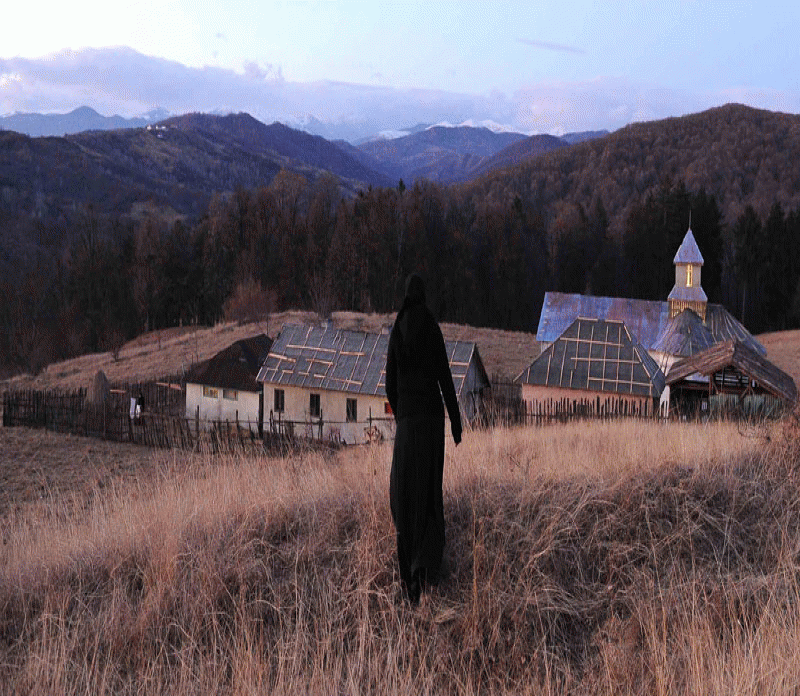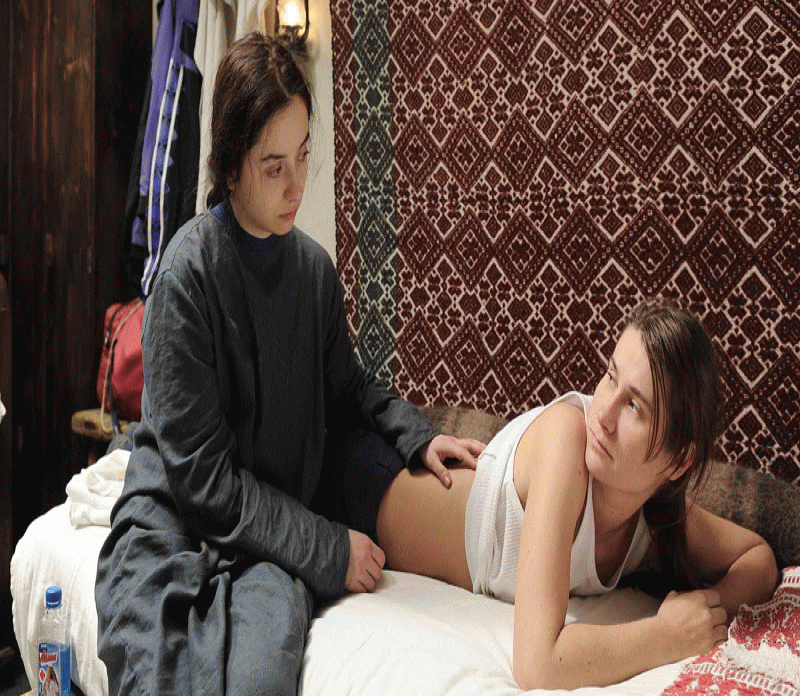
Cristian Mungiu
Life, Reality and Fiction
Mar 15, 2013
Web Exclusive
![]()
Romanian writer/director Cristian Mungiu refrains from agreeing with the comparison, but his latest film, Beyond the Hills, bears some of the distinguishing traits of a horror film. Even its English-translated title seems better-suited for a grisly B-movie than a film that earned major awards at Cannes, which Beyond the Hills did in 2012. Set at a remote Orthodox convent in Romania, the film observes the increasingly disturbing relationship between two women who, as children, became friends while living in an orphanage but in recent years have been residing in separate countries. Alina (Cristina Flutur) arrives in Romania to reconnect with Voichita (Cosmina Stratan) and tries to persuade her to return with her to Germany. But Voichita has found solace among the nuns and head priest at the convent. Voichita’s reluctance to abandon the spiritual and creature comforts of the convent only fuels Alina’s obsession with her friend, to the point that the nuns and priest believe that she is possessed and dangerous. We’ve seen similar scenarios play out in films ranging from Ken Russell’s The Devils to 2011’s The Roommate, but Mungiu blames any associations with genre films on Beyond the Hills’ chilling trailer, which uses the type of suggestive music cues that the director eschews.
“My inspiration is life and reality, and I try to stay as close to reality as possible,” he says. “I’m drawn to things that don’t work in society, to subjects which are very layered that speak about the effects of something not working in society and individual choices.”
Indeed, Mungiu’s film is based on actual events from 2005 that involved an exorcism, performed by a priest at a Moldavian monastery, that resulted in arrests and trials.
“It was very, very popular in the tabloid press,” Mungiu says of the story. “The source of the inspiration comes from two non-fictional novels that were written by this journalist [Tatiana Niculescu Bran]. She really documented in 2007 what happened, and she came up with a lot of details about all the circumstances. As you see in the film, everyone is acting out of good intentions but still there’s a tragedy at the end. I changed some things to protect those that are still living. I thought it was better to be a little bit fictional.”
 Cristian Mungiu’s Beyond the Hills is set at a remote Orthodox convent in present-day Romania.
Cristian Mungiu’s Beyond the Hills is set at a remote Orthodox convent in present-day Romania.
Mungiu, a former journalist, clarifies that the film being inspired by non-fiction novels does not mean that it’s a true story.
“Reality doesn’t repeat itself,” he explains. “Who knows what the true story was? I don’t think that films made about true stories are closer to reality than purely fictional films. I knew a friend who knew this priest very well. I thought about meeting him but finally I decided that it’s not good, not for him and not for me. I never wanted to make a documentary…this is not a re-enactment of what happened. It’s a way to have a benefit of speaking about this tragedy and things that don’t work in society.”
In 2007, Mungiu’s previous film, 4 Months, 3 Weeks and 2 Days—about a woman attempting to buy an illegal abortion for a friend during the last days of communist Romania—won the top prize at Cannes, the Palme d’Or. At Cannes last year, Mungui won the Best Screenplay award for Beyond the Hills, and Flutur and Stratan shared the festival’s Best Actress prize. The two leads had trained in theater but never had acted in a feature film before.
“In reality, they are not so connected as you see in the film,” Mungiu says. “They travel a lot now. All the time, they are in a different country. It’s kind of changed the spirit in their lives, because getting an award in Cannes for your first-ever experience with a camera, this is something. They didn’t have any experience at all. They haven’t even made short films, apart from what they made in school. But it’s really not important. With actors, they can either act and be natural—and this will be valid for them from the beginning—or not. And experience doesn’t really matter. I was looking for the energy that I really needed for the parts, and what I hope is that they are going to start a career in film…but it’s not that easy. People imagine that winning Cannes comes with an agent that will knock on your door and a lot of parts being offered to you, but it’s not like this. One of them is now being offered a part in a French film, the other was offered a very important part in a play, but it’s not like their lives completely changed. We are looking forward to seeing what happens next.”
 Cosmina Stratan (left) and Cristina Flutur shared the Best Actress prize at Cannes in 2012.
Cosmina Stratan (left) and Cristina Flutur shared the Best Actress prize at Cannes in 2012.
Like 4 Months, 3 Weeks and 2 Days, Beyond the Hills revolves around the trials of two female characters. In the latter film, it’s indicated that the women had faced sexual abuse in their past. Yet, Mungiu asserts that he doesn’t focus on gender when he works.
“I never start from the character, I start from the situation,” he explains. “I’m looking for situations that are strong, complex, intense—that speak about general human values which you can relate to. I think that women might be more often victims of the social violence because they are more fragile, but it’s something coming from the situation, from the stories themselves rather than my personal decision to make films about women. The films are about people not about women or men…. I wanted to speak about personal freedom in 4 Months, about a society that was so harsh on people. And here I wanted to speak about the relationship that people have to church in our society. All the films that I do are very much shaped by the story.”
For Beyond the Hills, the writer/director began with a 240-page screenplay and then cut 30 pages before filming. Two-and-a-half hours in length, it unfolds methodically but remains absorbing throughout, a testament to Mungiu’s particularly defined aesthetic approach.
“Everything is master shot in this film and in my previous film,” he says. “It’s a decision coming to the way I understand cinema. My films are not only about the story. It’s my point of view about cinema and a way of interpreting life. And part of it comes from this idea that life should be primarily the inspiration for cinema. In life, if you think about things, time flows like this, in a continuum. You can’t cut the moments that you don’t like. You have to live them all. So this is why I decided that if I want to make films, which are so much inspired by reality, I have to preserve this into filmmaking and I won’t be cutting because this is a way of saying that you are present there as a director. All the effort that I make is that I allow the situation to grow in front of the audience without watching me behind [the camera]. And this is why I avoid editing. This is why I avoid music. Music doesn’t exist in life. It won’t start now to wave to us that it’s the moment to be emotional. I think it’s so much more difficult but honest for your audience to create emotions and atmosphere only with actors. I think that we need to respect the audience and to understand the means of the art that we use.”
In Mungiu’s eyes, an even bigger challenge was the responsibility of making a film about flawed, misguided men and women of the cloth while working with a cast of religious actors.
“People are very sensitive on this subject,” he explains. “Very often, they had different opinions about that scene and the characters. I had to talk often about the difference between reality and fiction. That it’s not you, it’s your character. God will not send the thunder to the set. It sounds funny not but it’s not so funny on set.”
Mungiu admits that, in contrast with the accolades at Cannes, the film received some backlash from the Church in Romania. He describes the initial comments as harsh and dogmatic.
“Happily enough, later on, they started understanding that the film really is very balanced and is giving them the opportunity to speak about values that matter, both for us and for society in general,” he says. “That the film is neither for nor against religion. It could be about religion, about the role religion plays in society. The response from the general audience was better than I expected. We had the same kind of sympathy from people in Q&As that declared themselves as being religious or complete atheists, saying that they leave the theater with less stereotypes and prejudices than they had when they came to watch the film.”
Beyond the Hills currently is playing in select theaters and also is available On Demand.
www.sundanceselects.com/films/beyond-the-hills
Current Issue

Issue #72
Apr 19, 2024 Issue #72 - The ‘90s Issue with The Cardigans and Thurston Moore
Most Recent
- Ella McRobb Releases New Single “Slow Motion Heartbreak” (News) — Ella McRobb
- Light Verse (Review) — Iron & Wine
- Linn Koch-Emmery Drops New Single “No Hands” (News) — Linn Koch-Emmery
- Crumb Share Video for New Song “The Bug” and Announce New Tour Dates (News) — Crumb
- Sam Evian on “Plunge” (Interview) — Sam Evian

Comments
Submit your comment
There are no comments for this entry yet.